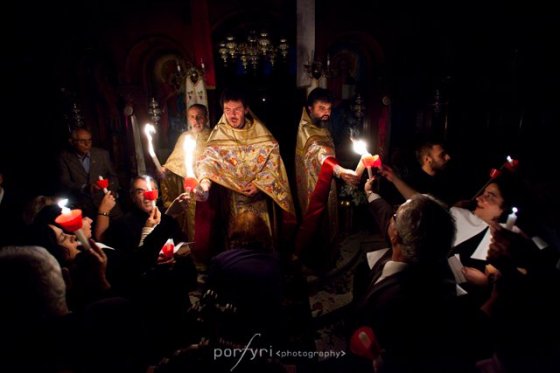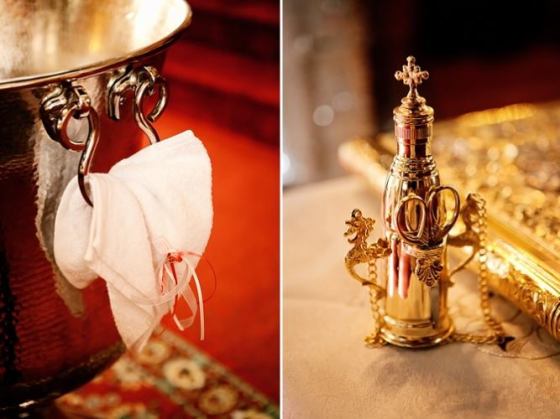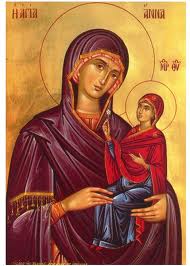
Greek Easter by Pofyri.com.au
The Great 40 Days
The fasting period before Easter has just begun. The Greek Orthodox Church calls this period “Σαρακοστή” (Sarakosti) – the Great 40 Days or “νηστεία” (nistia) the Great Fast. For Greek Orthodox people, this is the most important fasting season of the Church year.
For many years, I have attended Church only for special occasions. This normally includes, the midnight Easter Service, Christmas morning, Weddings, Christenings and Funerals. Now that I am married, a little bit older and a little bit wiser, my spiritual journey has become more significant in my life. As I learn and grow, I share my experiences and my learnings here with you on the blog.
This Easter, I want to learn more about our Easter traditions and how we celebrate them with our family and in the Church.
Here is what I’ve learnt so far:
- In Greece, the week before Great Lent is celebrated with Carnival – a time for celebration, eating, drinking and being with friends.
- During Carnival (“Απόκριες” – apokries) people dress up (similar to Halloween in America) and they eat meat, lots and lots of meat.
- Great Lent officially begins on Clean Monday or Ash Monday. In Greece, Clean Monday is a public holiday and a day of rest. Traditionally people ‘clean up’ their lives spiritually and physically. This day is the beginning of the fasting period.
- On Clean Monday, Greek people will celebrate with the tradition of flying kites. Many also use this day to clean their kitchen utensils and their house. On this day, it is tradition to make lagana which is a bread specific made for the Great Fast.
A Personal Reflection
I don’t live in Greece. I was born and raised in Australia. So, the Greek traditions of Carnival and Clean Monday is very new to me. I have learnt about it because I now have friends who live in Greece and who help me with this blog.
It is interesting to reflect on this tradition from my own perspective. It makes sense. In Greece everyone knows about these traditions as it is celebrated nationally. In fact, everyone gets a holiday to celebrate. However in Australia, this tradition is only celebrated by the Church and there are many Greek Australians who are completely unaware of how fasting is a significant part of our spiritual and Greek way of life.
The more I learn about Greek traditions and our Orthodox religion, the more I understand about its importance in my life.
Why Do We Fast?
The GOARCH website shares a great story about how and why we fast. Theo Nicolakis suggests that sometimes we fast just because that is what we are told to do. It is what our parents do or what our grandparents tell us to do. He says that “we respect certain religious traditions and observe certain practices of our faith simply because our mothers did them. This is not necessarily wrong, but it is a sure prescription for turning these traditions in to empty and meaningless customs.”
I guess that is the reason why most of my generation of young Greek Australians don’t go to Church or Fast during Great Lent. We don’t see the point in it. It doesn’t have meaning nor does it make sense in our everyday lives. In Greece, everybody follows the tradition but in Australia, we are not properly educated about why we do the things that we do.
Everybody has their own opinion about what is right and what is wrong. Some people say that your should not eat meat during Lent, others tell you not to eat dairy products. Some say that you should just give something up, like smoking. There are many guideline about what you should and should not do during Lent, but the decision must always be your own.
Theo Nikolakis tells us that “Fasting is a way of emptying ourselves from the cares and concerns of this world.” Fasting is not just about cutting out certain foods from our diet. True Fasting is about letting go of our obsessions and our materialist connection in this world. It is about your own personal journey and the things that you learn about yourself during the 40 days of Lent. It is about the mindful connection that you make with yourself, through your decisions and your actions. It is the act of true Fasting that will enable you to receive God.
Rules For Fasting:
Once you have decided to fast for Great Lent, you should then make a decision or a commitment to yourself about what you will do. Use this list a guide or suggestion – it is just one of those ‘should’ and ‘should not’ lists that I borrowed from this website.
First Week of Lent:
- Only two full meals are eaten during the first five days, on Wednesday and Friday after the Presanctified Liturgy.
- Nothing is eaten from Monday morning until Wednesday evening, the longest time without food in the Church year.
- For the Wednesday and Friday meals, as for all weekdays in Lent, meat and animal products, fish, dairy products, wine and oil are avoided.
- On Saturday of the first week, the usual rule for Lenten Saturdays begins (see below).
Weekdays in the Second through Sixth Weeks:
- The strict fasting rule is kept every day: avoidance of meat, meat products, fish, eggs, dairy, wine and oil.
Saturdays and Sundays in the Second through Sixth Weeks:
- Wine and oil are permitted; otherwise the strict fasting rule is kept.
Holy Week:
- The Thursday evening meal is ideally the last meal taken until Pascha. At this meal, wine and oil are permitted.
- The Fast of Great and Holy Friday is the strictest fast day of the year: even those who have not kept a strict Lenten fast are strongly urged not to eat on this day.
- After St. Basil’s Liturgy on Holy Saturday, a little wine and fruit may be taken for sustenance.
- The fast is sometimes broken on Saturday night after Resurrection Matins, or, at the latest, after the Divine Liturgy on Pascha.
Wine and oil are permitted on several feast days if they fall on a weekday during Lent. Consult your parish calendar. On Annunciation and Palm Sunday, fish is also permitted.
If you are looking for some good recipes to cook while fasting then check out Pres Vassi’s Lentern Recipe List or The Greek Vegan and The Greek Vegetarian.
♦
Do you know of any fasting rules?
♦
Related topics you might love:
 Sia Aristidou is fascinated by the rituals and traditions celebrated in Greek culture. Sia writes about love, marriage, family and tradition and sells beautiful handmade wedding gifts at the Greek Wedding Shop.
Sia Aristidou is fascinated by the rituals and traditions celebrated in Greek culture. Sia writes about love, marriage, family and tradition and sells beautiful handmade wedding gifts at the Greek Wedding Shop.
Learn More About Greek Weddings & Traditions
Subscribe to the Blog and Follow Us:
















 Sia Aristidou is fascinated by the rituals and traditions celebrated in Greek culture. Sia writes about love, marriage, family and tradition and sells beautiful handmade wedding gifts at the
Sia Aristidou is fascinated by the rituals and traditions celebrated in Greek culture. Sia writes about love, marriage, family and tradition and sells beautiful handmade wedding gifts at the 








